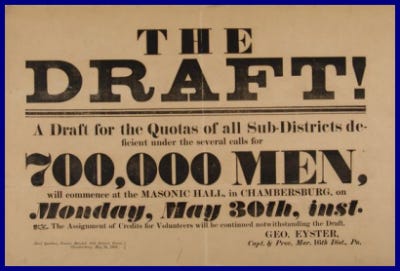In recent days, I’ve found myself in a situation I try to avoid: having too many writing projects going at once. I got back the manuscript of my forthcoming book on famous people who had dramatic chapters in their lives in New Jersey from the copy editor for my review right in the middle of drafting a chapter of my work-in-progress on women in colonial and revolutionary Massachusetts. I owe an Election Day piece on the presidential contest to Current magazine, and I’m trying to keep up with this newsletter. (There’s also the small matter of a full-time teaching job.) I generally manage the flow better; I hope to get back on track in the next week.
Last week, I wrote a piece slated to run in Current in December on abortion. It came to me in my advanced U.S. history seminar when I was discussing the notorious Constitutionally crafted three-fifths compromise, in which slaves counted as 60% of a person for the purposes of representation in Congress. This awkward piece of legislative legerdemain remained in place for three-quarters of a century in the United States before the abolition of slavery. I wondered: was there anything else like it? The answer came to me quickly: what might be called the two-thirds compromise in Roe v. Wade, in which abortion was legal for the two first trimesters of a pregnancy for half a century. “Like slavery,” I wrote, “abortion is an issue with strong moral overtones, multiple practical complications, and ideological differences that are difficult to reconcile, in this case a matter of whether you regard—or at what point you regard—a fertilized ovum as a human being. (Legally savvy anti-abortion advocates like to invoke the notorious Dred Scott Supreme Court decision of 1857, which ruled that slaves have no rights a white man is bound to respect, substituting the terms “unborn child” and “woman” as the nouns in question.)
Also in the piece:
For many abortion rights activists, pre-eminent principle at stake is female bodily autonomy: my body, my choice. Those invoking it overlook, or perhaps are unaware, the fact that male bodily autonomy has routinely been overridden for thousands of years through conscription, often with deadly consequences. One reason this may not be obvious is that the suspension of the draft in the United States occurred within a week of Roe v. Wade in 1974, the high tide of left libertarianism in this country. (This was also the high tide of support for the ultimately failed Equal Rights Amendment, which would have strengthened abortion rights still further while requiring women to register for the draft—which to this day they are not required to do, even as men are required to do so after their eighteenth birthday.) Of course one could argue that a person’s bodily autonomy should not be regulated for any reason. But wars, like births, have also led to some of our most cherished rights, among them the abolition of slavery. The resumption of the draft is only one war away—in recent ones, volunteers have been pressed to serve multiple tours of duty because of troop shortages.
Anyway, I gotta get back to work! I hope the next time you peruse this page things will have slowed down.



